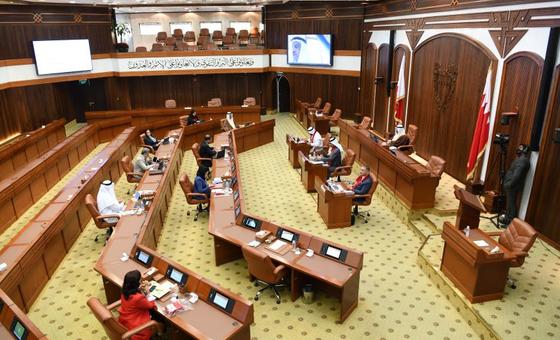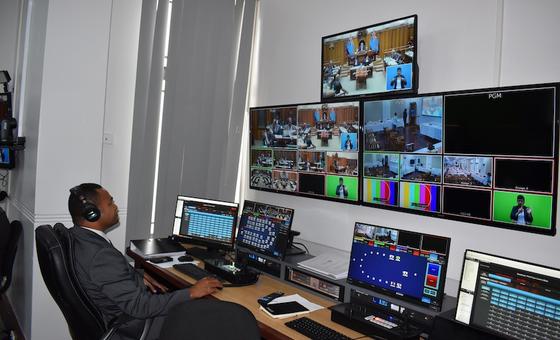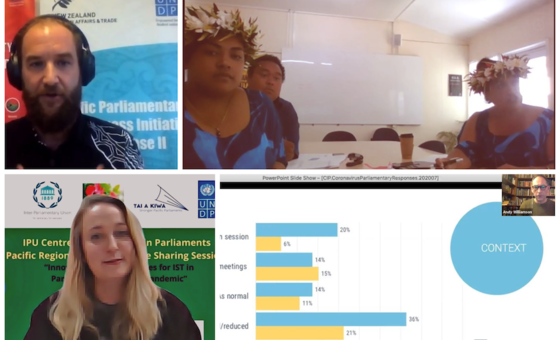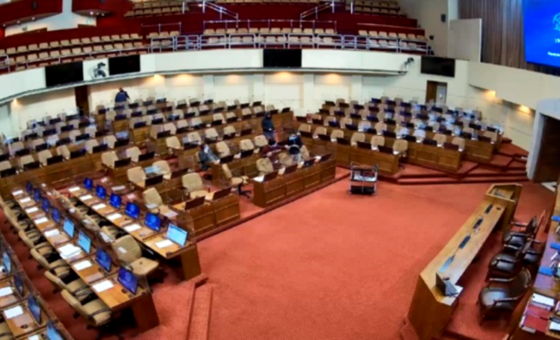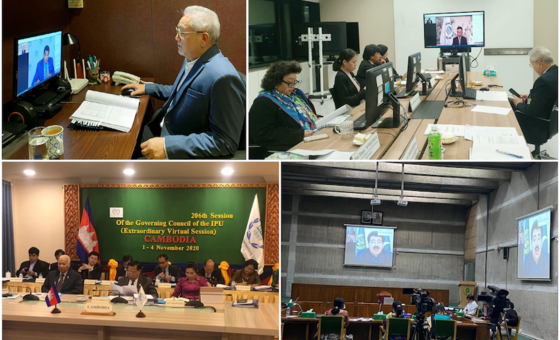- ImpactWe help parliaments to become greener and to implement the Paris agreement.We support democracy by strengthening parliamentsWe work to increase women’s representation in parliament and empower women MPs.We defend the human rights of parliamentarians and help them uphold the rights of all.We help parliaments fight terrorism, cyber warfare and the proliferation of weapons of mass destruction.We encourage youth participation in parliaments and empower young MPs.We support parliaments in implementing the SDGs with a particular focus on health and climate change.
- ParliamentsNearly every country in the world has some form of parliament. Parliamentary systems fall into two categories: bicameral and unicameral. Out of 190 national parliaments in the world, 78 are bicameral (156 chambers) and 112 are unicameral, making a total of 268 chambers of parliament with some 44,000 members of parliament. IPU membership is made up of 180 national parliaments
Find a national parliament
We help strengthen parliaments to make them more representative and effective.. - EventsVirtual eventThe International Court of Justice (ICJ) was constituted under the United Nations Charter to help nations settle disputes peacefully in accordance with international law.
- Knowledge
Discover the IPU's resources
Our library of essential resources for parliamentsGlobal data for and about national parliamentsLatest data and reports about women in parliamentResolutions, declarations and outcomes adopted by IPU MembersRecent innovations in the way parliaments workThe latest climate change legislation from the London School of Economics' database
Issue 7
IPU Innovation Tracker
The quarterly electronic bulletin from the Centre for Innovation in Parliament
Issue 7
Welcome to the seventh edition of the Innovation Tracker. We look at how parliaments have adapted their functioning during the pandemic with a focus on the parliaments of Bahrain, Chile and Fiji, as well as parliaments of the Pacific countries. We also cover the historic remote voting at the recent IPU Governing Council, when 394 parliamentarians from 142 countries voted for the new IPU President.
There are updates from the Open Data, Transparency, ICT Governance, Hispanophone and Southern Africa Regional hubs.
Innovation Tracker contributions
We are posting examples of innovation in parliament on Twitter using the hashtags #innovation #parliament. Please join us in using these hashtags, or send us good examples that we can share!
Do you have an example of innovative parliamentary working methods to share in the Innovation Tracker? Tell us about it via this online form or by e-mail to [email protected].
Updates from the hubs
Thematic
Revision and realignment of the 2021 hub outputs
Open data hub
In coordination with the secretariat of the Centre for Innovation in Parliament (CIP), the Open Data hub has revised its planned outputs for the Inter-Parliamentary Open Data Cloud project due to the pandemic and resulting disruption. The hub will focus on two key outputs in the short term: 1) a series of videos to engage non-G1 audiences; and 2) a second virtual hub meeting to discuss a new schedule for the project.
Videos: In addition to its existing videos about the open data website, the hub will produce new ones aimed at non-G1 parliaments. The new English, French and Spanish videos will encourage these parliaments to contribute to the hub’s work and the Open Data Cloud project. The Brazilian Chamber of Deputies will provide elements including the script, images and sound, and will invite hub members to feature in the videos. The videos will be produced through a series of virtual meetings with hub members between November 2020 and May 2021. The videos’ aims are:
- For managers: to explain the idea behind the open data cloud project and showcase parts of it, including an overview of the main deliverables, the implementation schedule and the expected benefits for parliaments and society.
- For technical staff: to outline all of the above and a more detailed technical perspective on open data file structures and data exchange technologies; and to demonstrate the use of search engines and open data samples, including by end users doing legislative research and comparative analyses.
- For users: to set out the idea behind the project, and showcase its key benefits for parliaments and society through a detailed demonstration of how, for example, MPs and legislative advisors can best use search engines, and how those in academia and related fields can use open data when writing on comparative legislation.
Second Open Data hub meeting: In addition to the videos, the Open Data hub is also aiming to host its second virtual meeting in March 2021. An in‑person meeting was originally planned for May 2020 in Ottawa but was postponed due to the pandemic. The meeting will aim to review the most recent technical definitions (which was 20 per cent of the agenda planned for Ottawa) and discuss ways to collaborate on a hybrid schedule of virtual and face‑to‑face meetings.
Host: Brazil
Open data hub
Preparing for the hub inaugural meeting
Transparency
The concept for the Transparency hub has been endorsed by the Knesset Speaker and its Director General. The hub team is now preparing an inaugural virtual meeting, to be held by mid‑December. A core group of six secretaries general (or equivalent) will attend to take stock of parliamentary transparency and related developments, and to consider how these are affecting openness and parliamentary work. Based on this, the meeting will formulate the hub’s vision and objectives, and define ways of working for the future. A follow‑up meeting is planned for future hub transparency leads to develop a hub workplan and define implementation activities.
Host: Israel
Transparency
The European Parliament and the IPU formalize their cooperation on the IT Governance Hub
ICT governance hub
On 9 October 2020, the Secretaries General of the European Parliament (Mr. Klaus Welle) and the Inter‑Parliamentary Union (Mr. Martin Chungong) signed a memorandum of understanding about cooperating on the IT Governance hub.
The hub was established by the European Parliament. It is a global expertise network that covers areas such as IT strategy, planning and efficiency. Every day it mobilizes knowledge wherever it is needed. The hub hosts an online learning platform that is currently used by over 50 organizations or parliaments. The platform helps parliaments to improve their IT governance by enabling them to self-assess their digital maturity and deploy other good practices. In addition to online learning, the hub is planning to start capacity‑development activities in collaboration with CIP regional hubs.
The CIP secretariat and hub coordination team are currently discussing how to increase synergy with the other thematic and regional CIP hubs in 2021.
Regional
Hispanophone parliaments in Latin America increase their innovation knowledge sharing through regional webinars
Hispanophone hub
Since June, the Hispanophone hub has held four regional webinars. The knowledge shared by different hub members has provided valuable insights into the pandemic response of hispanophone parliaments.
- 19 June. This was the first meeting of the Hispanophone hub. It was organized by CIP and the Chilean Chamber of Deputies, with support from the National Democratic Institute. As host of the hub, the Chamber of Deputies introduced the hub concept. Participants included IT directors and senior information management staff from Spanish‑speaking parliaments in the region. CIP provided a global overview of the pandemic response. Individual parliaments then provided brief updates on the current situation and the technology solutions they were using for increased business continuity.
- 24 August. At the second hub meeting, Claudio Prieto (IT Director, National Assembly of Ecuador) presented a case study on the Assembly’s transition to increased remote working and virtual plenary sessions.
- 21 September. At the third meeting, Mr. Juan Manuel Cheppi (Secretary General, Chamber of Deputies of Argentina) described how his legislature had innovated in response to COVID‑19. He also discussed the pandemic’s impact on the parliamentary administration and longer‑term opportunities that the parliament’s innovative work had made possible. These opportunities were being considered for future strategic planning.
- 2 November. At the fourth meeting, Dr. Andy Williamson (speaking on behalf of CIP) gave the most recent global update on the pandemic response. The meeting focused on the Chamber of Deputies of Chile, its new practices and the significant effects that had been felt on daily parliamentary work and life. It also gave an insight into perspectives and considerations for the future.
Host: Chile
Hispanophone hub
SADC-PF member parliaments discuss policies for technology use after the pandemic
Southern African hub
The first regional webinar discussed the initial pandemic response of the hub’s parliaments. After that success, the hub held a second regional meeting on 26 October against the background of the pandemic, inter-parliamentary cooperation through the SADC-PF,[1] and the need for parliaments to adopt technologies for hosting virtual meetings.
The Secretary General of the SADC-PF opened the meeting. IT Directors and senior IT staff from SADC-PF member parliaments then gave presentations. The objective of the meeting was to establish a requirements baseline for policies that would give guidance on how to use new technologies after the COVID-19 pandemic. The meeting also sought to consolidate the different ways that member parliaments had innovated in the face of the pandemic to enable parliamentarians to perform their duties. Issues surrounding connectivity, infrastructure and meeting management systems, and trends such as emerging 5G and high‑performance cloud computing were considered at length.
The opportunities and challenges of the pandemic and the adoption of new technologies were discussed. Most of the challenges hinged on the state of ICT infrastructure, low bandwidth for running parliamentary meetings via video conferencing, and in-house systems. The meeting concluded by discussing the position of the SADC-PF on embracing these technologies, and how to train parliamentarians effectively (using virtual platforms) on new technologies that affect the way they perform their duties.
[1] Southern African Development Community Parliamentary Forum
Host: Zambia
Southern African hub





